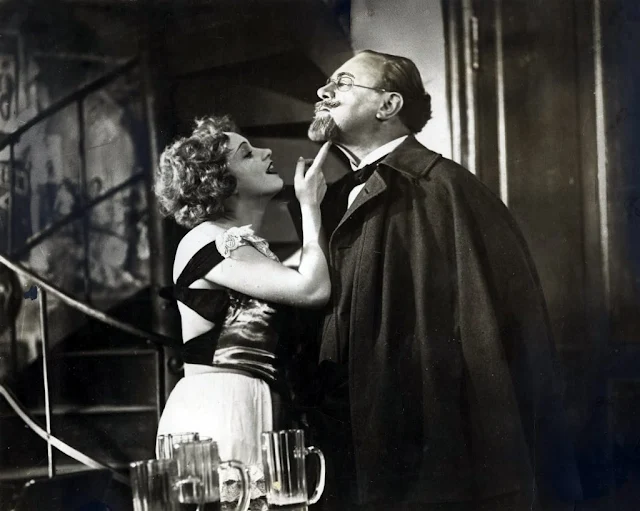 |
| Marlene Dietrich and Emil Jannings in The Blue Angel |
Lola Lola: Marlene Dietrich
Kiepert, the Magician: Kurt Gerron
Guste Kiepert: Rosa Valetti
Mazeppa, the Strongman: Hans Albers
The Clown: Reinhold Bernt
Director of the School: Eduard von Winterstein
School Caretaker: Hans Roth
Angst, a Student: Rolf Müller
Lohmann, a Student: Roland Varno
Erztum, a Student: Carl Balhaus
Goldstaub, a Student: Robert Klein-Lörk
Innkeeper: Károly Huszár
Rath's Maid: Ilse Fürstenberg
Director: Josef von Sternberg
Screenplay: Carl Zuckmayer, Karl Vollmöller, Robert Liebmann
Based on a novel by Heinrich Mann
Cinematography: Günther Rittau
Art direction: Otto Hunte
Film editing: Sam Winston
Music: Friedrich Hollaender
Josef von Sternberg's The Blue Angel still has some of the earmarks of a film made during the transition from silence to synchronized sound, namely the tendency to hold a shot a beat or two longer than is actually necessary, so the narrative doesn't always move along at the speed we anticipate. But Sternberg is clearly ready for sound, as the final scene shows. The camera tracks back from the dead professor, clutching his old desk so tightly that the caretaker who found his body has been unable to loosen his grip. Meanwhile, we hear the clock striking midnight, with the twelfth stroke barely audible as the screen fades to black. It's a touching moment, made possible by the several shots and sounds of the clock* that occur through the film as a kind of indicator of Rath's decline from precise and punctual to dissipated and tardy. Otherwise the sound on the film is sometimes a little harsh to the ear, which makes Sternberg's relatively sparing use of it welcome. Many scenes are staged in near-silence, letting the action rather than the dialogue carry the story. Marlene Dietrich's baritone recorded well, which is one reason her career took off when sound was introduced, but early in the film she's allowed to sing in an upper key which is more than a little off-putting. Fortunately, by the time we get to Lola Lola's big number, Friedrich Hollaender's "Ich bin von Kopf zu Fuß auf Liebe eingestellt" (the subtitles use the English language version, "Falling in Love Again" instead of a literal translation), Dietrich is back in the correct register. The Blue Angel thrives on Dietrich's performance, which eclipses Emil Jannings's overacting, though he does provide some genuine pathos toward the end of the film. I don't quite believe the ease with which the professor falls from grace, but I'm not sure whether the fault lies entirely with Jannings or with the screenplay.
*I don't think there's ever an establishing shot of the tower where this clock resides, only closeups of its face and the procession of figures below as the hour strikes. Is it perhaps on the town hall, the Rathaus, in which case there's a kind of submerged pun at work?